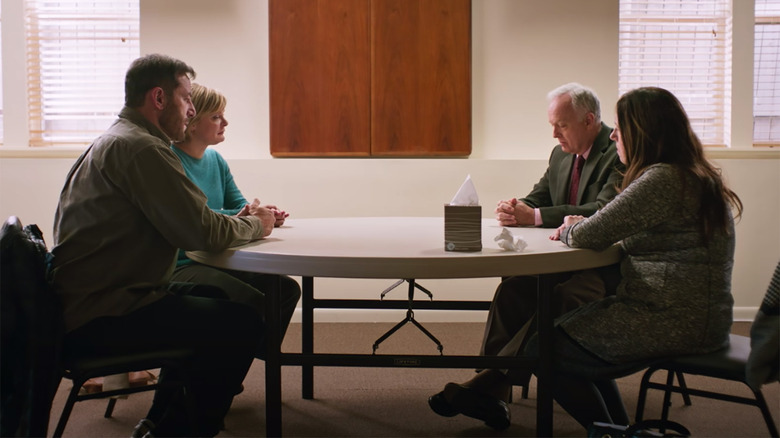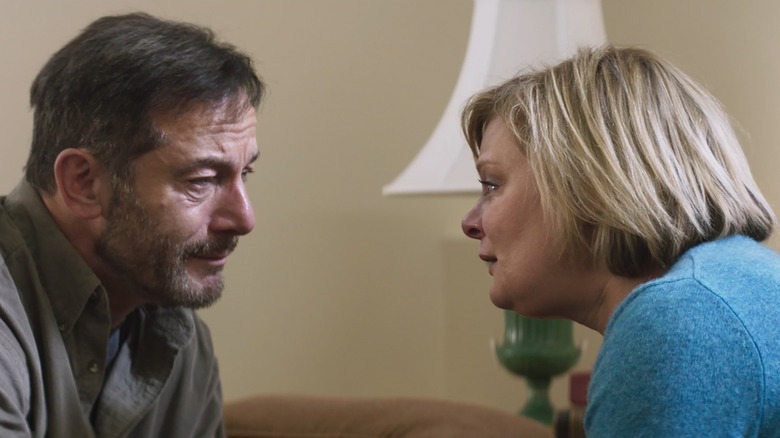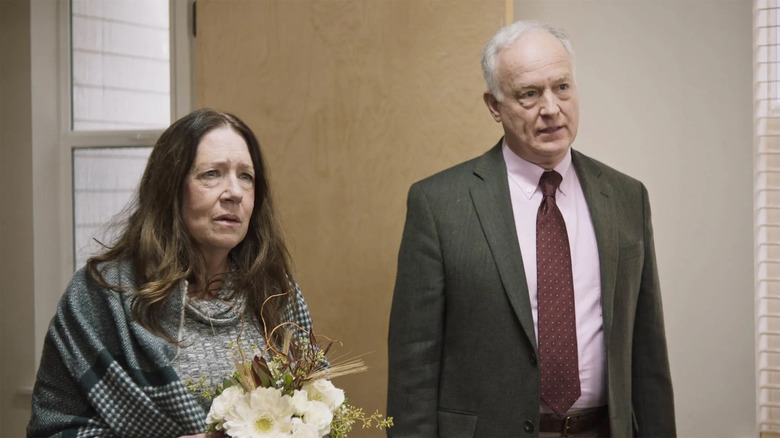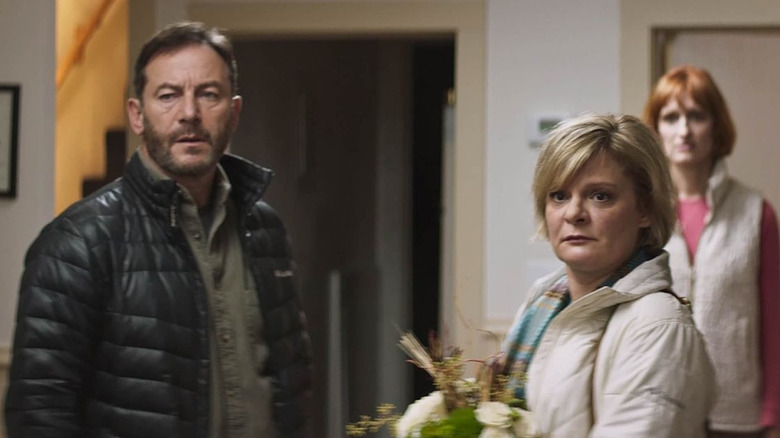Mass Director Fran Kranz Opens Up About Crafting A Different Kind Of School Shooting Drama [Interview]
"The Cabin in the Woods" co-star Fran Kranz made his feature directorial debut at the 2021 Sundance Film Festival earlier this year with a harrowing, gut-wrenching drama called "Mass," from a script that he also wrote. The film stars Jason Isaacs, Martha Plimpton, Ann Dowd, and Reed Birney as four parents who have agreed to meet in a small church to hash out the harrowing details of an unspeakable tragedy involving their children. One of them was the victim of a school shooting, the other was the shooter.
"Mass" is nothing short of extraordinary. It's an exemplary display of deceptively simplistic filmmaking that is bolstered by four of the best performances you'll see this year, maybe even this decade, and a story that will tear out your heart and leave you with an empty box of tissues. We spoke with writer/director Fran Kranz about the process of crafting such an intense, powerful, and emotionally devastating film for his directorial debut, which is all the more difficult when you consider the politically charged subject matter. Find out how "Mass" came to be, the challenge of confronting the politics of gun control, and the logistics of how the production team pulled off such an intimate production.
"I wanted to know how you could move forward, if it was possible to heal..."
I love this movie so much. I actually first saw this movie when it premiered during Sundance earlier this year. I loved it then, and I was happy to watch it again before I talked to you just to refresh myself, because this is a phenomenal movie. How long has this been percolating inside your head?
Oh, gosh. Honestly, it's all come together pretty fast, which is probably why I'm so overwhelmed these days. Right after the Parkland shooting, I went on Amazon and started buying books of about shootings, shootings in America, the mass shooting in Norway. I felt like I had to know more because I was scared and kind of infuriated and kind of confused by what was happening. At that point, it was strange to me to become so obsessive about it and focused, but it was because I was a parent. It was the first time a major shooting like that had happened since my daughter had been born, so it forced me to confront these things differently, I think. Parkland was February 2018, and I had my first drafts of "Mass" showing up as soon as March, April, and May of 2018.
I was not trying to make a movie when I bought those books. When I went out and got [those books], I wanted to know more about what was going on. I had no intention of making a movie. I was thinking about doing something else, and I've been dreaming about directing for as long as I can remember. But I came across these meetings, and I had been so kind of afraid by the notion that, if anything like this ever happened to me, that I might not be able to move forward, that I was so afraid of kind of living with hate and blame and pain. And I wanted to know how you could move forward, if it was possible to heal, if it was possible to forgive offending parties. So I came across these meetings and thought that's what they're doing. That's what they're doing, and I want to dramatize that, because I can't think of anything more important.
I love that you kind of stumbled upon turning this into a movie. One of the most brilliant things about it is how you present a perspective that I don't think is thought of very much. Hearing what the parents of the shooter have to say and the struggles that they have as the parents of someone who did this heinous thing, how they're not able to grieve the way everybody else was. Can you talk about the difficulty of presenting something like that without making it seem like you're being sympathetic to the killer?
I was struck by how much empathy I felt for these parents. It had not occurred to me going into the research. Obviously we think of the victims. We think of those families. And I came across stories about parents, and I didn't find monsters. I did not find bad people. I found complex human beings. I found people who love their children unconditionally and irrationally and make mistakes with good intentions. I just found real people. You know what I mean? I came across real people every step of the way.
So in the writing, it never occurred to me to have good or bad or to have an antagonist and a protagonist. It never occurred to me to have someone clearly at fault. That's just not what I ever found. I never found that was truthful. I don't to find evidence of that. When I do this research, I just find complex human beings trying to make the best of a situation. And it's tragic. It's just terribly, terribly tragic. But I approached the writing with the idea that these are four human beings that are trying to do something good here. They're trying to do something positive by sitting down with one another, despite how difficult it is. I just think that it takes so much courage and integrity. And I wanted to write the characters with dignity because of that.
"The camera tries to mirror, in parallel, the emotional journey of the characters and the story."
Speaking of those characters, all four of the stars in this movie give unbelievable performances, and you capture some truly gut-wrenching and subtle moments of just how they react to each other. Certain words hit them so hard. How did you go about shooting this so that you had ample coverage to find those bits in the editing room? What was the length of the takes like, and how did you make sure that you had what you wanted?
We shot the conversation in chronological order. We felt like we had to, in order to capture all the layers and emotions of it, right? So that was always by design. We had a short two and a half day of rehearsal, but we did some really critical table work of the script. We picked it apart. We made sure all the words were there to carry them on the emotional journey they needed to go. We did not have time to talk about how to get to these emotional places. The best I could do was make sure the words were there that would carry them there and allow them to get to these emotional heights.
On set we had two cameras in the conversation. We had two cameras shooting. I thought we'll never get through this with one camera because you're right. There are so many little details, so many internal moments, so many private moments between partners or couples, so many emotions, and [to capture that], we needed to have two cameras. We developed — Ryan Jackson-Healy, my cinematographer, and I — we developed a very basic system that would essentially circle the table over the course of the day, depending on where the light was coming through the windows. We were shooting in Idaho, so in November, it was dark at five o'clock. It was still pretty dark at eight in the morning. So we were really shooting a movie on 9-to-5 days, which normally, you have like 12-hour days. It's kind of unbelievable. It makes me all the more supportive of the IATSE strike, just on a side note. We had very little time, so it was critical that we developed a comprehensive system just to cover our basis.
So we had these basic kind of two shots on dollies that would circle the table. Even when there wasn't movement, we could at least move the dolly in between takes and create a new setup as quickly as possible. But we had two cameras on a dolly for the shoot, but the cameras slowly evolve over the course of the film. As the characters become more emotional, the camera tries to mirror, in parallel, the emotional journey of the characters and the story. So while it begins with stable static, two shots and singles, very basic coverage, it evolves into slowly deteriorates into a handheld camera. And then eventually we shift lenses to have a different perspective of the world, changing something I thought might illustrate how loss and tragedy changes the way you see the world.
Yeah, I didn't notice that until the second viewing. As the tension is building and emotions start running high, the cameras started to get a little bit more unstable along with the characters, which was an incredible idea.
Thank you. I appreciate it. At the end of the day, even the handheld footage, as the scene reaches kind of a climax, the cameras were still placed in the same places. We never tried to reinvent the wheel. We just wanted to add language to it. We just kind of gave it little upgrades here and there, but we always wanted to keep it very simple and not overthink it. Because you're right. There's so much to capture. If we decided one day to reinvent the world and have our cameras in a new location, we'd potentially be missing something because we had established a very comprehensive way to cover every corner of the table.
"I think it is really gripping storytelling to have to lean in and figure out what's happening."
I wanted to ask, how difficult has it been navigating the marketing for this movie? It seems like you've wanted to play your cards pretty close to the vest by not necessarily coming out and really saying what the movie is about. Even within the movie itself, it's 15 minutes before the conversation really begins. Then it's, I think, roughly 30 minutes before the actual tragedy is uttered out loud. What was your hope in kind of slow rolling the reveal like that and not giving everything away?
That's a great question. I'm a first time director, so the marketing is really left up to the marketing team and Bleecker Street has done an amazing job. The movie seems to be getting a lot of buzz and it's so, like I said, it's overwhelming and gratifying. I think it is really gripping storytelling to have to lean in and figure out what's happening. I enjoy that in movie. I like mystery. I like the suspense of a good mystery or thriller. In many ways, "Mass" plays like that. There's a gripping quality to it. It's engaging. It is a bit of a mystery, but I didn't write it to be that.
All I cared about was, are these characters speaking truthfully based on the information they know and what they lived through? What would they walk into a room and discuss? They're not going to walk into this room and start talking about the events of the day immediately. They know the events of the day. They know what happened. They know a lot of information, frankly. Over the years, they've accumulated a lot of information. They're sitting on a lot.
So we were really careful, and I was in the writing process too. But when I rehearsed with the actors, we really scrutinized the script to say, is this something that would really need to be said, or would you already know this? Or if you knew this, what else might you say? So it takes about 35 minutes for a character to sort of pointedly or directly speak to what the film is about. But that's also because she has no reason to say that until she has a reason to. She doesn't need to come into the room and tell people something that they all know. She says it out of a moment of maybe anger or frustration. She says it to make a point. She doesn't say it for the sake of — what's the, what is the word I'm thinking of?
Exposition?
Exposition, thank you. She's not trying to catch people up to speed. She's trying to make a more direct point with those words.
I think that line hits so much harder because of that too. It feels like the air was stuck out of the room when she says that it makes it so much more powerful.
I appreciate it. It's welcome. The movie, the fact that it's so gripping, it's hard to stop watching. All of that stuff is really welcome and it's a testament to the actors, my editor and the cinematographer, the whole team. But I, truthfully, as a writer, I just wanted these people to speak the way I believe human beings would speak in a room in this situation.
"I really worry that these things just aren't stopping."
One last thing, I wondered if you had intentionally decided to limit how much you referenced when it comes to the political debate about gun violence. It feels like it's more character-driven than trying to be preachy. And I wondered if you wrestled at all with how much you wanted to say about that topic in this movie.
Yeah. I will admit, in every draft, that scene got shorter and shorter and shorter. And then in the edit, it got even shorter. They did talk a little bit longer about the issues and the contentious issues. It always ended with Martha Plimpton's character saying, "Why are we talking about this?" That was always my thought, that these people would not be here to talk politics, but admittedly, the authors [of the books I read] did talk about politics, and it probably went too long for even what the intention of the scene was. I think a lot of that was just, maybe I felt the need to put what I had learned doing the research on paper.
But speaking to that last question about what would these people really want to say in this room, it just became clear with each draft and each edit that there's no way the character of Gail is going to sit here and listen to this for this long. So we just cut it smaller, and it became smaller and smaller. I mean and I'll say this, when I was doing the research, I learned a lot about it. I learned a lot of statistics. I learned about a lot of loopholes into how these events, these tragedies happen. All I really cared about were the people. All I really cared about were hearing about children, details of kids, teachers, families. It broke my heart. Just by spending two years crying in front of a laptop and not being able to fall asleep at night because of the stories that I'd read.
I really worry that these things just aren't stopping. They're just happening. They just keep happening and it's infuriating and terrifying and confusing. And I can't help but wonder if we have to have a different mode of thinking about it, if we have to approach this differently. If we approach it with issues and contentious issues, then we are immediately putting other people on the defensive it immediately becomes antagonistic. I just can't help but wonder, what if we just focus on the people and the suffering? If we can see that in people, if we can cultivate more empathy in our society and care and compassion for victims and survivors, we just might not tolerate this anymore. We might change our behavior if we can really put ourselves in these people's shoes. That's so much of the intention of the movie, and it has really nothing to do with politics.
Absolutely. Thanks a lot for your time, Fran. I appreciate it. And I'm going to be rooting for this movie to get some major award consideration when the time comes.
Hey, thank you, man. Me too.



